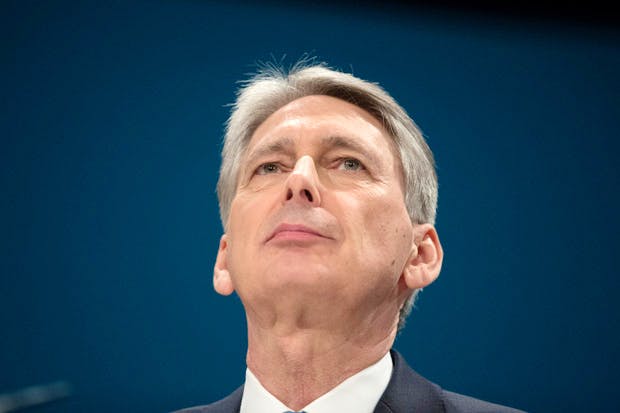Leaving Philip Hammond in charge of the government was always going to be a risk because of his habit of putting his foot in it. There was the debacle of his first budget, then his saying in Cabinet that driving a train was so easy that even a woman could do it, and his comments that public sector workers are “overpaid”. Now, with the Prime Minister walking in the Alps, Hammond is in charge and has goofed again – this time in an interview with Le Monde.
“I often hear it said that the UK is considering participating in unfair competition in regulation and tax. That is neither our plan nor our vision for the future. The amount of tax we raise as a percentage of our GDP puts us right in the middle of the pack. We don’t want that to change, even after we’ve left the EU. I would expect us to remain a country with a social, economic and cultural model that is recognisably European.”
This is a typical Hammond blunder: something that is technically correct, but is daft to say out loud. It was correct to say that women can drive trains, correct to say that, if you include pensions, public sector salaries are about 10pc higher than outside government – but it’s insensitive to say this means they are “overpaid”. After each blunder you can imagine Hammond asking: “What’s the fuss about? What I said was perfectly logical.”
The UK is engaged in negotiations with the European Union, and message discipline is vital. As acting Prime Minister, it’s Hammond’s job to maintain that discipline and make sure none of his colleagues speculate in any way that might serve to undermine the Prime Minister and David Davis when they enter those talks. Contradicting the government line is unhelpful at the best of times; to do it at a time of Brexit talks is staggeringly irresponsible.
As he should know, the UK government’s line is that, if the Brexit talks go wrong, it reserves the option to engage in tax competition. A senior Cabinet member spelled it out in a widely-reported interview with Welt am Sonntag.
“I personally hope we will be able to remain in the mainstream of European economic and social thinking. But if we are forced to be something different, then we will have to become something different. If we have no access to the European market, if we are closed off, if Britain were to leave the European Union without an agreement on market access, then we could suffer from economic damage at least in the short-term. In this case, we could be forced to change our economic model and we will have to change our model to regain competitiveness. And you can be sure we will do whatever we have to do. The British people are not going to lie down and say, too bad, we’ve been wounded. We will change our model, and we will come back, and we will be competitively engaged.”
This was none other than, erm, Philip Hammond, speaking in January. So when he told the French that he “hears it said” that the UK was considering cutting taxes and regulation to be more competitive he was presumably referring to himself. It’s one thing for Cabinet members to contradict each other, but Hammond is taking the art of the Tory rift up a level – and slapping himself down.
When Hammond hits the rocks, he usually blames Brexiteers for trying to undermine him – but he’ll struggle to do so in this case. Next time, when he’s left in charge, it should be on one strict condition: no interviews.







Comments